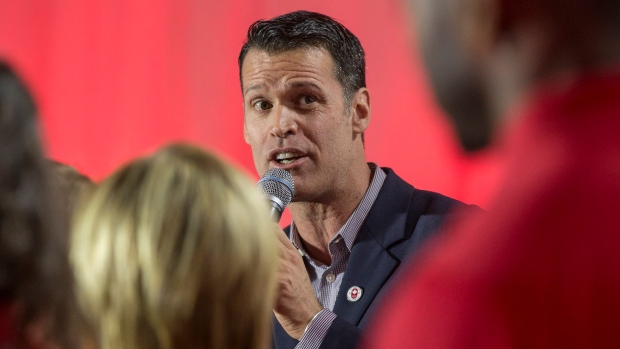Mar 24, 2020
Tewksbury supports decision to postpone Tokyo Olympics
On Tuesday, the International Olympic Committee made the decision to postpone the Tokyo Olympics until 2021. Canadian Olympic gold medallist Mark Tewksbury joined Halford and Brough on TSN 1040 Vancouver Tuesday and said he supports the decision made by the IOC.
TSN.ca Staff

On Tuesday, the International Olympic Committee made the decision to postpone the Tokyo Olympics until 2021, a move that followed an announcement by the Canadian Olympic Committee that they would not be sending athletes to the Games unless there was a change in date.
Canadian Olympic gold medallist Mark Tewksbury joined Halford and Brough on TSN 1040 Vancouver Tuesday and said he supports the decision made by the IOC.
"Obviously, I think it’s the right thing to do,” Tewksbury told TSN 1040. “The Canadian Olympic Committee stated on the weekend that we wouldn’t be fielding a team even if they went. I know we weren’t alone in that sentiment. I’m glad the IOC seems to have finally made a decision and it’s the right one.”
The 52-year-old, who captured gold in the 100-metre backstroke at the 1992 Barcelona Olympics and served as Canada’s chef de mission at the 2012 London Olympics, said that while it will be hard for athletes to get themselves back into the mindset for the Games, it would be even harder to get ready under these current conditions.
"It will be difficult to refocus when the time comes,” said Tewksbury. “I guess there is just so much uncertainty right now around every aspect of daily life that where the training and how do I get ready for the Olympics fits into that probably isn’t a priority right now for a lot of athletes. They are looking after their health and their families and trying to sustain themselves in different ways.
“It will take some adjustment, but it’s the right time of the cycle. There is momentum behind these past three years that the training has been done, there is muscle memory. They’ll be able to pick it up again, but it will absolutely take a huge recalibration to get to whatever that date finally is when it’s announced.”
Another aspect that has to be considered are the financial ramifications of moving the Olympic Games to 2021. Tewksbury said that it’s a decision that will impact the athletes most importantly, but also the sports federations, particularly in the smaller disciplines.
“It has just thrown a wrench financially into the whole movement, because the marketing money actually gets distributed, a large part of it, to all of the international federations and that funds international sport for a lot of sports that don’t get the television exposure that the larger sports get.
"All the way from sports federations to the sponsors of the Olympics are taking some big hits depending on what industry they’re in, right down to the athletes. It’s a pretty lean life even at the best of times if everything is working for the athletes, so given all of these new circumstances, absolutely there are some really tough times ahead.”
The logistics of staging the Games in 2021 will also force all the sports involved to make adjustments to their own competition calendars.
"It’s going to be really complicated, it sounds easy to say, ‘Oh we’ll just postpone for a year,’ but the Olympics are basically like 26 world championships happening at the same time for all the different sports,” said Tewksbury. “Those sports actually have world championships in 2021 all over the world in different places. There is going to be a fairly significant ripple effect.”
